
The 1928 Glenwood stove is the workhorse as well as the visual focus of the kitchen. It is particularly appropriate: Glenwoods were made by the Weir Stove Co. of Taunton, Mass.; and this 1910 house had a kitchen upgrade by its first owners in 1927. “It’s the original 1910 layout, now with updated, late-’20s and early-’30s appliances and bits and bobs,” Berman explains. The stove has six burners, two ovens, a simmer shelf to hold food just below boiling, a warming oven, and two broilers—one of them vertical.
The vintage stove came from the Antique Stove Hospital in Little Compton, Rhode Island, and was restored at the Stanley Iron Works in Nashua, New Hampshire.
In fact, period appliances set the tone and cutoff date for the kitchen. Also vintage is Frigidaire’s 12-cu.ft. W-12 model made in 1929–30. It came from Antique Appliances in Clayton, Georgia. It began life as a sulfur-dioxide unit but has been converted to use modern refrigerant.
All of its hardware is original (except for the conversion element out of sight below). Originally chrome-plated, the degraded hardware was replated in nickel to match the Glenwood’s trim.
While Berman says the Glenwood works at least as well as a modern range, look closely and you might spy an under-counter dishwasher to the right of the sink.
Diese Geschichte stammt aus der November - December 2019-Ausgabe von Old House Journal.
Starten Sie Ihre 7-tägige kostenlose Testversion von Magzter GOLD, um auf Tausende kuratierte Premium-Storys sowie über 8.000 Zeitschriften und Zeitungen zuzugreifen.
Bereits Abonnent ? Anmelden
Diese Geschichte stammt aus der November - December 2019-Ausgabe von Old House Journal.
Starten Sie Ihre 7-tägige kostenlose Testversion von Magzter GOLD, um auf Tausende kuratierte Premium-Storys sowie über 8.000 Zeitschriften und Zeitungen zuzugreifen.
Bereits Abonnent? Anmelden
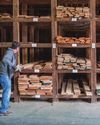
Navigating the Lumberyard - Here's some lumber lingo you should know before you venture into a lumberyard.
Here's some lumber lingo you should know before you venture into a lumberyard. Almost everyone fixing an old house will end up at a lumberyard-whether it's a local supplier or the organized aisles of a big-box home-improvement store.
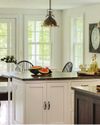
a farmhouse renewed
Sensitive renovations and restoration work preserved a house that dates to 1799.
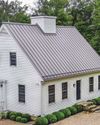
AN OVERVIEW OF METAL ROOFING
METAL ROOFS ARE RESURGENT, FOR GOOD REASONS.
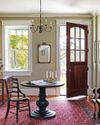
ENDURING BEAUTY IN WALLS of STONE
Now back in the family who had been here since 1830, the old farmhouse is again ready for generations to come. Additions dating to 1840 and the 1950s were preserved.

ARCHITECTURAL DETAILS COME TO LIFE
Owners and their designer celebrate the unique features of a 1912 Arts & Crafts Tudor.
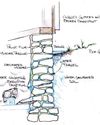
For a Wet Basement Wall
If there's problem common to old houses, it's a wet basement. I'm not talking about occasional flooding, but rather a basement that apparently seeps or leaks after even a rain shower or during snowmelt. Several approaches are available; sustainable solutions will get to the root of the problem.
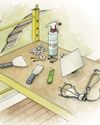
Patching a Plaster Wall
Fix a hole in the wall with a few common tools and some drywall supplies. Practice your technique!
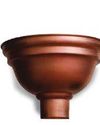
Roofing & Siding
Make note of these historical and unusual materials for the building envelope.
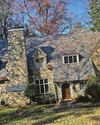
The Riddle of the water
When water incursion happens, the roof isn't necessarily the culprit. Maybe snaking a drain line, or clearing debris from a clogged gutter, temporarily will stem a leak. But a recurring problem usually means other forces are at work. It takes persistence-and a team with the right skills and patience—to identify the source and apply a solution.

Light-filled Craftsman Redo
For a dark kitchen in a 1914 Illinois house, the trick was anchoring white expanses with woodsy warmth.